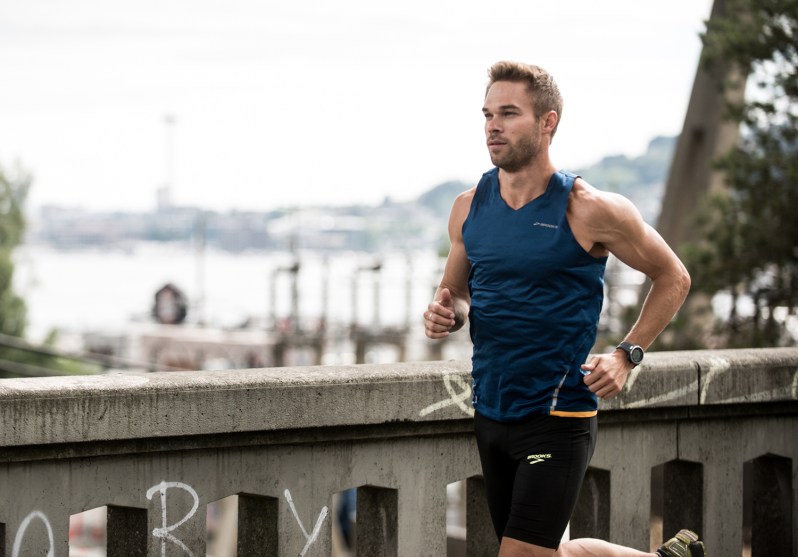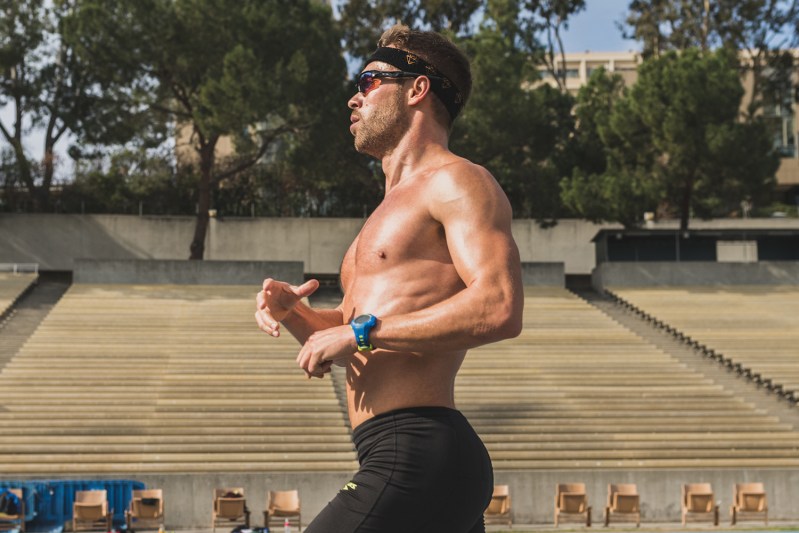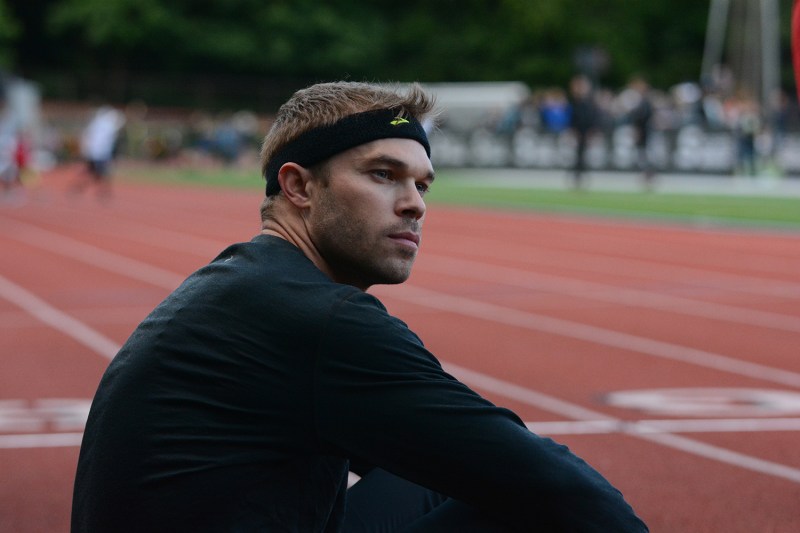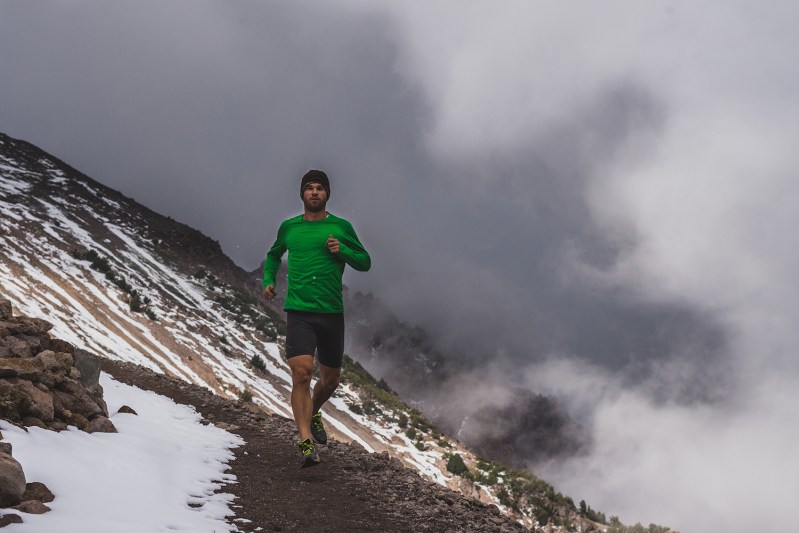
It’s hard to hold the world’s attention as a track and field athlete. In the U.S., football and basketball hoover up press, and in the rest of the world, it’s football and, I don’t know, maybe cricket. But for the entirety of his professional career, Nick Symmonds, professional runner, managed to wrest eyeballs and headlines away from bigger, better-funded sports by his own charm, ingenuity, and bravery. “I’m a short, stocky kid from Boice,” the 37-year-old says. “I knew that for me to get paid, I was going to have to play a different set of cards.”
Today, several years into retirement from the sport, Symmonds, from his home of Springfield, Ore., has only extended his reach, crafting himself into a social media celebrity and CEO, making his second act more successful than his already unlikely first.
After bursting onto the pro running scene in 2008, a ticked-off Division III alum looking for blue-chippers to kick down, he achieved a blanket-like control over competitors and then expanded out. His exploits were legendary and headline-making: He dated Paris Hilton, was rumored to appear on The Bachelor, and auctioned off a square of his shoulder for advertising space via eBay. He openly criticized Russian law in Russia, an action that would see a lesser man creatively poisoned. He single-handedly took on his national governing body and Nike concurrently, which would be the equivalent of Tom Brady going after both the NFL and Wilson footballs. And despite these secondary demands on his time, energy, and attention, Symmonds continued to dominate. As an eight-time U.S. champ, he won so much in his distance, the 800 meters (approx. half-mile), that few people could say much in criticism besides that he always was running his mouth. “Maybe it’s the arrogance of youth or just high from coming off winning that silver medal, but I’m like, ‘I’m untouchable right now, I can say whatever I want,’” he says of his pro-LGBTQ stance at the 2013 World Championships in Moscow. His comments made international headlines, including the New York Times and CNN. “So I did,” he says. “I said exactly what was on my mind.”

Symmonds now leads a quiet life, changing from hunting to fishing to surfing to skiing to mountaineering by the month in a place he calls an outdoorsman’s playground. His 9-to-5 is the CEO of Run Gum, a caffeine-infused gum company which he founded with his college coach, Sam Lapray, in 2009. And during what time that could only be his lunch break, he’s growing his YouTube channel like a weed, and it has now surpassed 300,000 subscribers.
“Instead of running on Diamond League tracks throughout Europe, I run at South Eugene High School — which actually is getting more views than what I used to do as a pro,” he says. “It’s just crazy where the eyeballs have gone.”
Symmonds is not just your garden-variety Insta-narcissist, although he’ll freely admit he loves being in front of the camera. Rather, his time in the spotlight has always been a tool. As a pro athlete, he used his position to fling fire at whatever hypocrisy and hypocrites he saw. Often it was at USA Track and Field, the sport’s national governing body in the U.S. and the ultimate arbiter of who made championship and Olympic teams. This power allowed it to package and sell its athletes to advertisers, pocketing much of the money while restricting their ability to attract individual sponsors. With many, including Symmonds, living on the four-year, feast-and-famine Olympic model, to be a pro track athlete was akin to taking a vow of poverty. He wasn’t trying to unionize athletes or reform through legislation, all of which had been tried before and has been tried since, and with little success. “I was just saying, ‘This is bull—-,’” he says. “This system is wrong, and here is why.”

For his action, Symmonds drew fire from all sides. USATF mouthed promises to reform without following through and talked smack behind his back. His fellow athletes, some likely hoping to retain the little their benevolent dictators offered, threw shade and subtweets. Nevertheless, he persisted. “I wasted a lot of my powder on these [national governing bodies] that weren’t going to change. What a colossal waste of time,” he says. “I look back and I think, ‘What if I just created something?’”
“Nick was a disruptor, which was needed in the sport, and quite honestly still is,” says Paul Doyle, agent and founder of the American Track League, which announced a four-meet deal with ESPN in January. “He let athletes know it was OK to speak up and to stand up against the leaders of the sport.”
If there’s hope for the track and field breaking from its every-four-year focus, it’s through efforts by Doyle, who founded the fledgling league in 2013, shaking up the dusty format of the traditional track meet. Symmonds competed in one of the league’s meets in 2015, and he speaks in support and appreciation for it. “[Founding a meet] would have done way, way more to help the sport of track and field rather than having mind-numbing meetings with USATF,” he says.
But Symmonds has built plenty. While winning his championships, he grew a chain of tanning salons in gloomy Eugene, Ore., eventually selling them, and now, as the CEO of Run Gum, he spends his days expanding the brand, which is already in Walmart, Target, and running and biking specially shops around the country. And still he wants more. “Anyone, anywhere can be an entrepreneur starting tomorrow,” he says. “I’m just starting to scratch the surface.”

Danny Mackey, Symmonds’ former coach and head coach of the Brooks Beasts Track Club, says he first met Symmonds on a run while visiting Eugene in 2007. Later, in a local bar, he was surprised to find that Symmonds, already a stud in the running world, locked eyes with him and remembered the out-of-towner’s name. When their coaching relationship began in 2014, he grew to know him better.
“The discipline I saw him have was one that you would write a book about,” Mackey says. “That’s why Run Gum is successful.”
Now, almost three years after retirement, Symmonds is seemingly moving faster than ever. He’ll race beachgoers in a turtle costume, rollerblade a four-minute mile, or pull a trout the size of your arm from a river. Pro track recedes, and yet there are only a few things he wishes he did differently. “I get asked a lot about the number one regret you have about your pro running career,” he says. “I chuckle and say that I didn’t start a YouTube channel earlier.”



